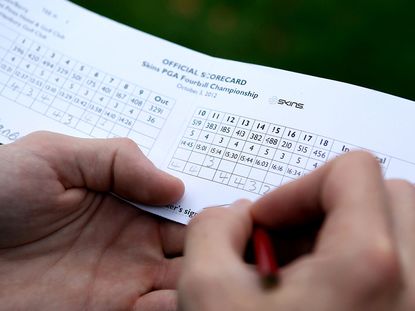What is Clause 19 all about?
Had a bad hole? Don't panic, there's always Clause 19...


Clause 19 of the CONGU Unified Handicapping System can prevent your handicap going up even if you have a shockingly bad hole.
Here’s the scenario: You’re playing in the Saturday Medal and start unpromisingly. On the 4th hole, you inexplicably lose a ball down the right hand semi rough. Rather than going back to the tee and causing an almighty pile-up, you graciously call off the search and tell your playing partner to mark you down for a No Return.
Given it’s your only game of the week, you continue to try for the remainder of the holes and, typically, start to play rather well; the best you’ve played for some months… Aaarggh…
At the end of the round you sign your card without thinking too much about it, you fire the numbers into the computer (including the dreaded no score at the 4th,) down a pint of orange and lemonade and exit the Club stage left, cursing another 0.1 on the handicap.
The following week at competition check-in, you’re astounded to see your handicap stated as one lower than it had been the previous weekend. “Impossible,” you say, “I NR’d last week and haven’t played since.”
So what’s happened? Well, it seems your handicap has been affected by clause 19 of the CONGU Unified Handicapping System.
More complicated golf Rules
Get the Golf Monthly Newsletter
Subscribe to the Golf Monthly newsletter to stay up to date with all the latest tour news, equipment news, reviews, head-to-heads and buyer’s guides from our team of experienced experts.
And what’s that?
Clause 19 relates to Stableford/Nett Double Bogey Adjustment. This is designed to place a limit on the maximum score a player can return on any single hole. Its intention is to make handicaps more reflective of player ability and reduce the impact of the occasional bad hole. It applies to handicap calculations only.
Basically the clause means that, for handicap purposes, the worst score a player can have on a single hole, in any competition, is a nett double bogey (effectively 0 Stableford points.)
If a player with a 12 handicap, competing in a strokeplay competition, scores an 8 at the 5th hole, a par-4 with a stroke index of 15, his score on that hole is reduced to a double bogey 6 for handicap purposes.
The same player also scores an 8 on the 15th hole, another par-4, but this time with a stroke index of 3. He gets a shot there, so his score is only reduced by 1 to a 7, a nett double bogey 6.
So a player may return a total nett score in strokeplay competition that is above the buffer zone but if they’ve had one or two terrible holes, they may still avoid their handicap going up, or even be cut, thanks to Clause 19 adjustments.
Yes, but last week I didn’t even return a completed score…
It doesn’t matter. According to Clause 19, the worst you could have done on that uncompleted 4th hole was the equivalent of 0 Stableford points or a nett double bogey. This will have been applied to your card for calculating handicap.
If the rest of your scores when added together with the nett double bogey at the 4th produced a total below the Competition Standard Scratch score for the day, your handicap will have been cut accordingly.
Other than making the handicap more reflective of a player's true ability, there are a couple of other good effects of Clause 19:
- It means a player still has something to play for in a strokeplay competition, even if they don’t finish a hole early in their round. You could still save 0.1, or even get cut. This is something all golfers should be aware of… how many are?
- It helps prevent a player from protecting their handicap. So: someone plays a blinder but then suddenly realises on the 18th tee they’re heading for a monumental cut just prior to the Club handicap knockout the following day; they “accidentally” knock a couple out-of-bounds then develop the yips on the green, finally knocking the ball in for a 14. Clause 19 won’t let them off with this sort of chicanery. For handicap, the 14 will be knocked down to a nett double bogey and they’ll, almost certainly, still be cut.

Fergus is Golf Monthly's resident expert on the history of the game and has written extensively on that subject. He is a golf obsessive and 1-handicapper. Growing up in the North East of Scotland, golf runs through his veins and his passion for the sport was bolstered during his time at St Andrews university studying history. He went on to earn a post graduate diploma from the London School of Journalism. Fergus has worked for Golf Monthly since 2004 and has written two books on the game; "Great Golf Debates" together with Jezz Ellwood of Golf Monthly and the history section of "The Ultimate Golf Book" together with Neil Tappin , also of Golf Monthly.
Fergus once shanked a ball from just over Granny Clark's Wynd on the 18th of the Old Course that struck the St Andrews Golf Club and rebounded into the Valley of Sin, from where he saved par. Who says there's no golfing god?
-
 'Gator Netting Is In Place' - Chevron Championship Venue Prepared For 'Safe' Winner's Jump
'Gator Netting Is In Place' - Chevron Championship Venue Prepared For 'Safe' Winner's JumpA tradition which began at the tournament's previous home could continue this year - if the champion is feeling brave enough...
By Jonny Leighfield Published
-
 New Balance 997 SL Golf Shoe Review
New Balance 997 SL Golf Shoe ReviewNew Balance produce some extremely stylish footwear and, in this review, Matt Cradock takes their spikeless 997 SL onto the course
By Matt Cradock Published